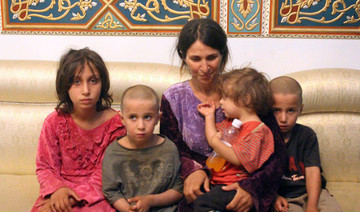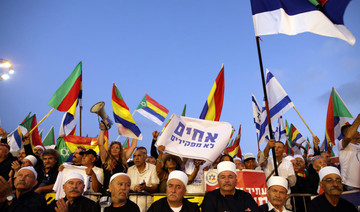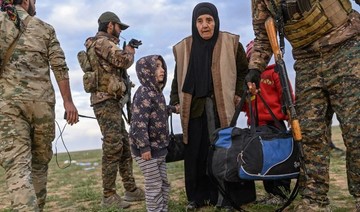MAJDAL SHAMS: An election poster at the entrance to Majdal Shams in the Israeli-occupied Golan Heights offers a rare reminder that the Druze community is about to vote for the first time in more than 50 years.
As across Israel, the residents of this mountainous region will have the chance to cast their ballots on Tuesday for their local councils.
But for the Druze of the Golan plateau these elections are different — and far more controversial.
Israel seized the strategic region from Syria in 1967, and later annexed it in a move never recognized by the international community.
Now many fear the push for a vote — the first since Israeli tanks rolled in — represents just another bid by the Jewish state to try to legitimize its control.
Such is the discontent that there has been a campaign to boycott the poll and a string of candidates have pulled out.
Dolan Abu Saleh, 40, is still in the race.
But he is not holding any public meetings or events and has to content himself with meeting a few voters in his offices.
“It is very sensitive,” he said.
Saleh, who is close to the Likud party of Israeli Prime Minister Benjamin Netanyahu, recognizes that calls for a boycott will likely keep most people from casting their ballots.
But he insists that for the Druze living in occupied Golan this vote is a good opportunity to make their voices heard.
Before now Saleh served two terms as mayor of Majdal Shams, elected both times by local council members who were themselves appointed by Israel’s Interior Ministry.
“Between being appointed and being elected, there is no doubt that an election is more democratic,” he said.
The majority of the 23,000 Druze in the occupied Golan have never opted to become Israeli citizens, according to Saleh.
But most are “permanent residents” of the Jewish state who are allowed to vote in the election, while only those who got citizenship can run for office.
This vote is taking place after a group of Druze lawyers petitioned Israel’s Supreme Court for the right to hold it so they can elect a mayor who will improve services for their community.
But the influential religious leadership has campaigned against them and, although there is little sign of enthusiasm, the community usually abides by their decisions.
In the village of Buqata, residents shut their front doors or shrug their shoulders when questions are asked about the election.
“We are not taking part,” says an elderly woman dressed traditionally in black with a white veil.
Amal Abu Shahin, 47, points at a Syrian flag painted on the wall behind him as he makes his point.
“We are Syrian,” he says. “This vote is not for us.”
But the war in Syria has changed the relationship between many in the community and their one-time homeland.
Where once Druze from the region dreamt of going to study or work in Syria, now the seven-year conflict has seen more and more youths turn their hopes toward Israel out of pragmatism.
“I’m for the elections, we’re with Israel now, Syria is over!,” says a 24-year-old man, who refuses to give his name.
But despite that he will not cast a ballot.
“There are people who will check who will vote or not,” he explains.
Political activist Sameh Samara says he can’t understand the calls to boycott the vote.
Sitting in his house he insists it could help bring better services and rejects the claim it will bolster Israeli claims of sovereignty.
It is better “to choose the right person, a child of this earth, rather than have someone imposed on us who is not suitable and not from here,” he says.
But from his balcony overlooking Majdal Shams and the disputed frontier 500 meters away, rights activist Wael Tarabieh holds a different opinion.
Across the divide that snakes through the mountains lies Syria, where almost everyone here has relatives still living.
And for him the election is just an attempt to further cement decades of unlawful occupation.
“It is a way to get recognition for the fundamentally illegal presence of Israel,” he says.
In Israeli-occupied Golan Heights, Druze struggle over first ever vote
In Israeli-occupied Golan Heights, Druze struggle over first ever vote

- Residents of mountainous region to cast their ballots on Tuesday for local councils
Daesh attack in Syria kills three soldiers: war monitor

- The militants “attacked a site where... regime forces were stationed“
- The Syrian army had sent forces to the area, where Daesh attacks are common
BEIRUT: Daesh group militants killed three Syrian soldiers in an attack Tuesday on an army position in the Badia desert, a war monitor said.
The militants “attacked a site where... regime forces were stationed,” the Syrian Observatory for Human Rights said, adding that a lieutenant colonel and two soldiers died.
The Syrian army had sent forces to the area, where Daesh attacks are common, ahead of an expected wider sweep, said the Britain-based Observatory which has a network of sources inside the country.
In an attack on May 3, Daesh fighters killed at least 15 Syrian pro-government fighters when they targeted three military positions in the desert, the Observatory had reported.
Daesh overran large swathes of Syria and Iraq in 2014, proclaiming a so-called caliphate and launching a reign of terror.
It was defeated territorially in Syria in 2019, but its remnants still carry out deadly attacks, particularly against pro-government forces and Kurdish-led fighters in Badia desert.
Syria’s war has claimed more than half a million lives and displaced millions more since it erupted in March 2011 with Damascus’s brutal repression of anti-government protests.
At least 9 Egyptian women and children die when vehicle slides off ferry and plunges into Nile River
At least 9 Egyptian women and children die when vehicle slides off ferry and plunges into Nile River

- The accident, which happened in Monshat el-Kanater town in Giza province, also injured nine other passengers
CAIRO: At least nine Egyptian women and children died Tuesday when a small bus carrying about two dozen people slid off a ferry and plunged into the Nile River just outside Cairo, health authorities said.
The accident, which happened in Monshat el-Kanater town in Giza province, injured nine other passengers, the Health Ministry said in a statement. Giza is one of three provinces forming Greater Cairo.
Six of the injured were treated at the site while three others were transferred to hospitals. The ministry didn’t elaborate on their injuries.
A list of the nine dead obtained by The Associated Press showed four were minors.
Giza provincial Gov. Ahmed Rashed said the bus was retrieved from the river and rescue efforts were still underway as of midday Tuesday.
The cause of the accident was not immediately clear.
According to the state-owned Akhbar daily, about two dozen passengers, mostly women, were in the vehicle heading to work when the accident occurred. It said security forces detained the vehicle driver.
Ferry, railway and road accidents are common in Egypt, mainly because of poor maintenance and lack of regulations. In February, a ferry carrying day laborers sank in the Nile in Giza, killing at least 10 of the 15 people on board.
Syrian first lady Asma Assad has leukemia, presidency says

- Statement stated that Asma would undergo a special treatment protocol that would require her to isolate
DUBAI: Syria’s first lady, Asma Assad, has been diagnosed with leukemia, the Syrian presidency said on Tuesday, almost five years after she announced she had fully recovered from breast cancer.
The statement said Asma, 48, would undergo a special treatment protocol that would require her to isolate, and that she would step away from public engagements as a result.
In August 2019, Asma said she had fully recovered from breast cancer that she said had been discovered early.
Since Syria plunged into war in 2011, the British-born former investment banker has taken on the public role of leading charity efforts and meeting families of killed soldiers, but has also become hated by the opposition.
She runs the Syria Trust for Development, a large NGO that acts as an umbrella organization for many of the aid and development operations in Syria.
Last year, she accompanied her husband, President Bashar Assad ,on a visit to the United Arab Emirates, her first known official trip abroad with him since 2011. She met Sheikha Fatima bint Mubarak, the Emirati president’s mother, during a trip seen as a public signal of her growing role in public affairs.
Yemen’s Houthis say they downed US drone over Al-Bayda province

- The Houthis said last Friday they downed another US MQ9 drone over the southeastern province of Maareb
DUBAI: Yemen’s Houthis downed a US MQ9 drone over Al-Bayda province in southern Yemen, the Iran-aligned group’s military spokesperson said in a televised statement on Tuesday.
Yahya Saree said the drone was targeted with a locally made surface-to-air missile and that videos to support the claim would be released.
The Houthis said last Friday they downed another US MQ9 drone over the southeastern province of Maareb.
The group, which controls Yemen’s capital and most populous areas of the Arabian Peninsula state, has attacked international shipping in the Red Sea since November in solidarity with the Palestinians in the war between Israel and Hamas militants, drawing US and British retaliatory strikes since February.
Iranians pay last respects to President Ebrahim Raisi

- Mourners set off from a central square in the northwestern city of Tabriz
- Supreme leader Ayatollah Ali Khamenei declares five days of national mourning
TEHRAN: Tens of thousands of Iranians gathered Tuesday to mourn president Ebrahim Raisi and seven members of his entourage who were killed in a helicopter crash on a fog-shrouded mountainside in the northwest.
Waving Iranian flags and portraits of the late president, mourners set off from a central square in the northwestern city of Tabriz, where Raisi was headed when his helicopter crashed on Sunday.
They walked behind a lorry carrying the coffins of Raisi and his seven aides.
Their helicopter lost communications while it was on its way back to Tabriz after Raisi attended the inauguration of a joint dam project on the Aras river, which forms part of the border with Azerbaijan, in a ceremony with his counterpart Ilham Aliyev.
A massive search and rescue operation was launched on Sunday when two other helicopters flying alongside Raisi’s lost contact with his aircraft in bad weather.
State television announced his death in a report early on Monday, saying “the servant of the Iranian nation, Ayatollah Ebrahim Raisi, has achieved the highest level of martyrdom,” showing pictures of him as a voice recited the Qur’an.
Killed alongside the Iranian president were Foreign Minister Hossein Amir-Abdollahian, provincial officials and members of his security team.
Iran’s armed forces chief of staff Mohammad Bagheri ordered an investigation into the cause of the crash as Iranians in cities nationwide gathered to mourn Raisi and his entourage.
Tens of thousands gathered in the capital’s Valiasr Square on Monday.
Supreme leader Ayatollah Ali Khamenei, who has ultimate authority in Iran, declared five days of national mourning and assigned vice president Mohammad Mokhber, 68, as caretaker president until a presidential election can be held.
State media later announced that the election would will be held on June 28.
Iran’s top nuclear negotiator Ali Bagheri, who served as deputy to Amir-Abdollahian, was named acting foreign minister.
From Tabriz, Raisi’s body will be flown to the Shiite clerical center of Qom on Tuesday before being moved to Tehran that evening.
Processions will be held in in the capital on Wednesday morning before Khamenei leads prayers at a farewell ceremony.
Raisi’s body will then be flown to his home city of Mashhad, in the northeast, where he will be buried on Thursday evening after funeral rites.
Raisi, 63, had been in office since 2021. The ultra-conservative’s time in office saw mass protests, a deepening economic crisis and unprecedented armed exchanges with arch-enemy Israel.
Raisi succeeded the moderate Hassan Rouhani, at a time when the economy was battered by US sanctions imposed over Iran’s nuclear activities.
Condolence messages flooded in from Iran’s allies around the region, including the Syrian government, Palestinian militant group Hamas and Lebanese militant group Hezbollah.
It was an unprecedented Hamas attack on Israel that sparked the devastating war in Gaza, now in its eighth month, and soaring tensions between Israel and the “resistance axis” led by Iran.
Israel’s killing of seven Revolutionary Guards in a drone strike on the Iranian consulate in Damascus on April 1 triggered Iran’s first ever direct attack on Israel, involving hundreds of missiles and drones.
In a speech hours before his death, Raisi underlined Iran’s support for the Palestinians, a centerpiece of its foreign policy since the 1979 Islamic revolution.
Palestinian flags were raised alongside Iranian flags at ceremonies held for the late president.



















